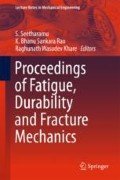Abstract
Alloy IN 718 is used for manufacturing many critical components of gas turbine engine such as compressor blades, discs, and shafts. During engine operation, these components are subjected to cyclic loading along with steady-state operation at high temperatures. These operating conditions induce damage resulting from interaction of creep and fatigue. In order to predict realistically the life of these components, it is necessary to understand creep–fatigue interaction mechanisms and important to carry out test at conditions simulating engine parameters. Therefore, isothermal LCF tests with and without hold time were conducted at a temperature of 600 °C, strain rate of 10−3 s−1 and total strain amplitude varying from 0.4 to 0.6%. Hold time of 1 and 5 min was inserted at maximum strain amplitude to give tensile dwell condition. In gas turbine engine, the presence of centrifugal force of rotating components leads to sustained tensile load in addition to varying loads; therefore, it was decided to have dwell time at peak tensile strains. The investigation revealed that the fatigue life was adversely affected when hold time was introduced at peak strain. The effect on fatigue life with 1- and 5-min hold is discussed. Deformation mechanism of tested samples was also studied using SEM.
Access this chapter
Tax calculation will be finalised at checkout
Purchases are for personal use only
References
Donachie MJ, Donachie SJ (2002) Superalloys a technical guide, 2nd edn. ASM International
Wagner HJ, Hall AM (1965) Physical metallurgy of alloy 718. DMIC Report 217
Bowers RJ, Lippold JC (1997) The effect of composition and heat treatment cycles on the repair weldability of alloy.joining and repair of gas turbine components. ASM International, pp 41–50
Richards NL, Benhadad S, Chaturvedi MC (2002) The influence of minor elements on the weldability of an Inconel 718-tvpe superalloy. Met Trans 33A:2005–2017
Hu D, Wang R (2009) Experimental study on creep-fatigue interaction behaviour of GH4133B superalloy. Mat Sci Eng A. 515:183–189
Billot T, Villechaise P, Jouiad M, Mendez J (2010) Creep-fatigue interaction behaviour at high temperature of a Udimet 720 nickel-base superalloy. Int J Fatigue 32:824–829
Tinga T, Brekelmans WAM, Geers MGD (2009) Time-incremental creep-fatigue damage rule for single crystal Ni-base super alloys. Mater Sci Eng A 508:200–208
Pierce CJ, Palazotto AN, Rosenberger AH (2010) Creep and fatigue interaction in the PWA1484 single crystal nickel-base alloy. Mater Sci Eng A 527:7484–7489
Totemeier TC, Tian H (2007) Creep-fatigue-environment interactions in Inconel 617. Mater Sci Eng A 468:81–87
Smith HH, Michel DJ (1986) Effect of environment on fatigue crack propagation behaviour of alloy 718 at elevated temperatures. Metall Trans A 17A:370–374
Evans WJ, Jones JP, Williams S (2005) The interaction between fatigue, creep and environmental damage in Ti6246 and Udimet 720Li. Int J Fatigue 27:1473–1484
Yokobori T, Yolobori AT Jr (2001) High temperature creep, fatigue and creep-fatigue interaction in engineering materials. Int J Pressure Vessels Pip 78:903–908
Banerjee A, Sahu JK, Paulose N, Fernando CD, Ghosh RN (2015) Isothermal low cycle fatigue and creep-fatigue interaction behaviour of nickel based superalloy Inconel 718. FFEMS 39(7):877–885
Gopinath K, Gupta RK, Sahu JK, Ray PK, Ghosh RN (2015) Designing P92 grade martensitic steel header pipes against creep–fatigue interaction loading condition: damage micromechanisms. Mat Design 86:411–420
Ostergren WJ (1976) A damage function and associated failure equations for predicting hold time and frequency effects in elevated temperature low cycle fatigue. J Test Eval 4(5):327–339
Acknowledgements
The authors express their gratitude to DRDO and Director, GTRE for supporting the work and granting permission to publish the data. The support and guidance provided by the Technical and Associate Directors are also gratefully acknowledged. The authors also acknowledge Director, NML for facilitating the mechanical tests at NML.
Author information
Authors and Affiliations
Corresponding author
Editor information
Editors and Affiliations
Rights and permissions
Copyright information
© 2018 Springer Nature Singapore Pte Ltd.
About this paper
Cite this paper
Paulose, N., Chandru Fernando, D., Banerjee, A., Sahu, J.K., Narendra Babu, S.N. (2018). Creep–Fatigue Interaction Study on Gas Turbine Engine Alloy. In: Seetharamu, S., Rao, K., Khare, R. (eds) Proceedings of Fatigue, Durability and Fracture Mechanics. Lecture Notes in Mechanical Engineering. Springer, Singapore. https://doi.org/10.1007/978-981-10-6002-1_25
Download citation
DOI: https://doi.org/10.1007/978-981-10-6002-1_25
Published:
Publisher Name: Springer, Singapore
Print ISBN: 978-981-10-6001-4
Online ISBN: 978-981-10-6002-1
eBook Packages: EngineeringEngineering (R0)

